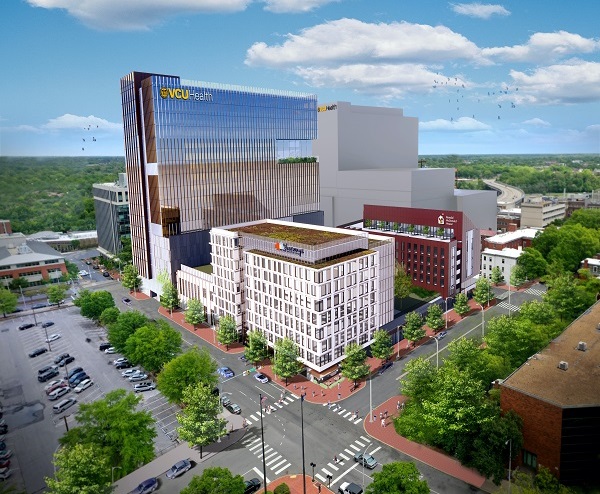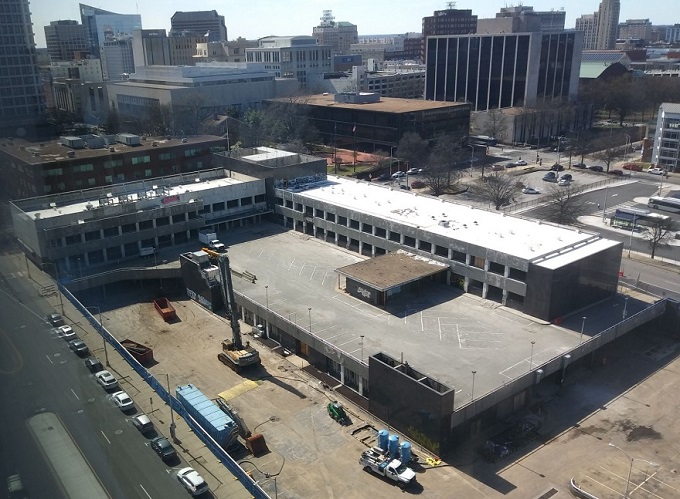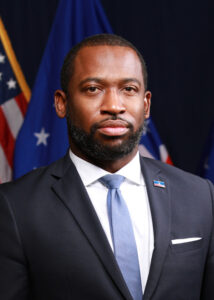
A rendering of the 20-story project that would have replaced the Public Safety Building. (BizSense file)
Financial fallout from a failed downtown development involving VCU Health is setting up an apparent fight between the city and the state.
Richmond Mayor Levar Stoney issued a statement Wednesday rebuking a directive from Virginia legislators included in the state budget that ordered VCU Health to find a way to stop paying real estate taxes to the city that stem from the health system’s aborted redevelopment of Richmond’s old Public Safety Building.
In his statement, Stoney said VCU Health’s obligation to make the payments is contractual and remains legally binding.
“I appreciate the General Assembly’s rightful concern about VCU Health System’s management of capital projects, but I believe that the state has misdirected their concerns by calling for VCU to back-out of a contract to avoid paying taxes to the City of Richmond,” Stoney said.
The state’s directive was tacked onto a budget item awarding VCU Health $5.2 million for construction planning for a new School of Dentistry, which the health system initially had eyed for the Public Safety site but is now planning to construct at its nearby Larrick Student Center property. The new site is specified in the budget language.
The language also directs VCU Health to “pursue to terminate” the real estate tax payments on the city-owned Public Safety property, which the health system agreed to make to keep the development tax-generating for the city. Real estate owned by the health system or Virginia Commonwealth University typically is exempt from local taxes.
The arrangement was formalized in an agreement between the city and developer Capital City Partners and was the basis for a 2021 agreement between the developer, VCU Health and the project’s financing group.
The annual payments, called payments in lieu of taxes or general obligation payments, were to be made over 25 years and would total nearly $56 million to the city. Three of those payments have been made so far, totaling about $2 million. The payments were to ensure that the city received real estate tax revenue from the site, regardless of how promptly, or successfully, the property was developed.
When the contract was negotiated, Stoney added Wednesday, the city “was intentional to ensure that the developer and any subsequent owner of the property was paying their fair share in real estate taxes to support city services.” The statement goes on to note “the high proportion” of state government and VCU Health buildings that fill much of downtown but are exempt from city taxes.
“Just because VCU Health System has had limited responsibility for paying real estate taxes historically, does not mean that’s the way it should always be,” Stoney said. “The VCU Health System community makes many contributions to our city and we’re glad to partner with them on a myriad of projects.
“But,” the statement added, “VCU Health System should not be looking for ways to get around paying their fair share and the state should not be in the business of negating legally-binding contracts.”
It isn’t clear from the budget whether VCU Health requested the language or legislators added it themselves. It also doesn’t link specific legislators to the language, which was added during the House and Senate’s amendments to the budget that they adopted over the weekend and sent to Gov. Glenn Youngkin to sign.
A VCU spokesman said the health system “does not have anything to add at this time” in response to a request Wednesday for an interview with VCU Health leadership.
When the city took back the Public Safety property last year after the project collapsed and VCU Health backed out as the master tenant, VCU and the health system said in a joint statement that they “will uphold our obligations as they relate to prior real estate tax commitments, as well as the demolition of the existing Public Safety Building structure.”
The obligation to demolish the building comes with a $5 million price tag. That, along with the real estate payments made so far – as well as a $73 million exit payment that VCU Health had to make to back out of the deal – bring the health system’s costs for backing out of the project to upward of $80 million. Gov. Youngkin has said the costs to VCU Health could end up totaling $100 million.

Site prep for demolition of the Public Safety Building has been underway for months. (Jonathan Spiers photo)
VCU Health has maintained that backing out of the project avoided much larger financial obligations that came with its deal to be the project’s anchor tenant, including $617 million in rent over a 25-year lease.
The 3-acre property at 500 N. 10th St. is several months into being prepped for demolition by DPR Construction, VCU Health’s contractor for the work. The demolition had been scheduled for completion this month.
The budget language directs the VCU Health System Authority to report back to the chairs of the House and Senate money committees by Oct. 1 “as to the feasibility and/or the status of the termination” of the tax agreement with the city. The directive was first reported by the Richmond Times-Dispatch.
Meanwhile, the General Assembly’s oversight agency, the Joint Legislative Audit & Review Commission, is conducting a study of the health system’s governance structure in light of the failed project. JLARC plans to report its findings later this year.

A rendering of the 20-story project that would have replaced the Public Safety Building. (BizSense file)
Financial fallout from a failed downtown development involving VCU Health is setting up an apparent fight between the city and the state.
Richmond Mayor Levar Stoney issued a statement Wednesday rebuking a directive from Virginia legislators included in the state budget that ordered VCU Health to find a way to stop paying real estate taxes to the city that stem from the health system’s aborted redevelopment of Richmond’s old Public Safety Building.
In his statement, Stoney said VCU Health’s obligation to make the payments is contractual and remains legally binding.
“I appreciate the General Assembly’s rightful concern about VCU Health System’s management of capital projects, but I believe that the state has misdirected their concerns by calling for VCU to back-out of a contract to avoid paying taxes to the City of Richmond,” Stoney said.
The state’s directive was tacked onto a budget item awarding VCU Health $5.2 million for construction planning for a new School of Dentistry, which the health system initially had eyed for the Public Safety site but is now planning to construct at its nearby Larrick Student Center property. The new site is specified in the budget language.
The language also directs VCU Health to “pursue to terminate” the real estate tax payments on the city-owned Public Safety property, which the health system agreed to make to keep the development tax-generating for the city. Real estate owned by the health system or Virginia Commonwealth University typically is exempt from local taxes.
The arrangement was formalized in an agreement between the city and developer Capital City Partners and was the basis for a 2021 agreement between the developer, VCU Health and the project’s financing group.
The annual payments, called payments in lieu of taxes or general obligation payments, were to be made over 25 years and would total nearly $56 million to the city. Three of those payments have been made so far, totaling about $2 million. The payments were to ensure that the city received real estate tax revenue from the site, regardless of how promptly, or successfully, the property was developed.
When the contract was negotiated, Stoney added Wednesday, the city “was intentional to ensure that the developer and any subsequent owner of the property was paying their fair share in real estate taxes to support city services.” The statement goes on to note “the high proportion” of state government and VCU Health buildings that fill much of downtown but are exempt from city taxes.
“Just because VCU Health System has had limited responsibility for paying real estate taxes historically, does not mean that’s the way it should always be,” Stoney said. “The VCU Health System community makes many contributions to our city and we’re glad to partner with them on a myriad of projects.
“But,” the statement added, “VCU Health System should not be looking for ways to get around paying their fair share and the state should not be in the business of negating legally-binding contracts.”
It isn’t clear from the budget whether VCU Health requested the language or legislators added it themselves. It also doesn’t link specific legislators to the language, which was added during the House and Senate’s amendments to the budget that they adopted over the weekend and sent to Gov. Glenn Youngkin to sign.
A VCU spokesman said the health system “does not have anything to add at this time” in response to a request Wednesday for an interview with VCU Health leadership.
When the city took back the Public Safety property last year after the project collapsed and VCU Health backed out as the master tenant, VCU and the health system said in a joint statement that they “will uphold our obligations as they relate to prior real estate tax commitments, as well as the demolition of the existing Public Safety Building structure.”
The obligation to demolish the building comes with a $5 million price tag. That, along with the real estate payments made so far – as well as a $73 million exit payment that VCU Health had to make to back out of the deal – bring the health system’s costs for backing out of the project to upward of $80 million. Gov. Youngkin has said the costs to VCU Health could end up totaling $100 million.

Site prep for demolition of the Public Safety Building has been underway for months. (Jonathan Spiers photo)
VCU Health has maintained that backing out of the project avoided much larger financial obligations that came with its deal to be the project’s anchor tenant, including $617 million in rent over a 25-year lease.
The 3-acre property at 500 N. 10th St. is several months into being prepped for demolition by DPR Construction, VCU Health’s contractor for the work. The demolition had been scheduled for completion this month.
The budget language directs the VCU Health System Authority to report back to the chairs of the House and Senate money committees by Oct. 1 “as to the feasibility and/or the status of the termination” of the tax agreement with the city. The directive was first reported by the Richmond Times-Dispatch.
Meanwhile, the General Assembly’s oversight agency, the Joint Legislative Audit & Review Commission, is conducting a study of the health system’s governance structure in light of the failed project. JLARC plans to report its findings later this year.

C’mon Levar. Shouldn’t you be spending your time trying to convince us we need a 3rd vote on a casino in Richmond?
Can I get an “Amen”!?!?
South side Richmond could’ve used that casino,there’s nothing else bringing 1500 jobs,people who didn’t want to go could have stay away.
The people voted. Then they voted again even more overwhelmingly. They were well-informed of the pros and the cons.
You are correct – what is also correct is that the precincts closer to the proposed development overwhelmingly voted in favor of it. In other words the people that would have been most affected by it wanted it.
Because of racist marketing.
What is exactly the “Fair share” that Mayor Stoney is talking about? It’s certainly not 56 million dollars for a project that never got off the ground. In my opinion the most that VCU should pay for is the cost to demolish the existing building. The city can then offer the “clean “property for development.
The fair share argument undermines his position. His best argument and one he is correct on is that for better or worse, VCU entered into a contract, and the legislature is in effect telling VCU to find a way to break that contract. Take the politics and the personal feelings about Stoney and the reaction to VCU’s malfeasance in agreeing to the deal out of it and there’s a valid, legally enforceable contract binding VCU to make these payments.
No VCU did not enter into any agreement with the City. Capital City Partners signed the development with the City who were obligated to PAY the city taxes for the development. As part of the pullout of the failed projects negotiations to get out of the lease VCU had to pay fees and costs to the developer for borrowing and taxes payments that were promised as part of the lease. VCU did a BAD deal but Stoney is only pushing now (and when it fell apart) because not one of his proposed econ dev projects (CoStar is not Stoney –… Read more »
I’m not clear on what your argument is. Are you saying that all the reporting about this issue is incorrect and VCU did not enter into a contract that they would pay $56m PILOT (Payment in lieu of taxes) fees over 25 years even if the building wasn’t completed? Or are you nitpicking that VCU Health entered into a contract with Capital City Partners, which was part and parcel to the CCP contract with the city? I haven’t had the pleasure of reading the contracts so I can’t speak to the accuracy of those statements, but since none of the… Read more »
Yes but the facts and signed documents matter. Ordinance 2021-24 and 2021-25 are a matter of public record. The only reference to VCU in the entire 115 page deal is Attachment H which was a delegation and assumption agreement that says if the deal falls through they are on the hook for the losses to the City. VCU was NEVER a signer to any agreement with the City on the overall project The delegation agreement is again between Capital City Partners and VCU. The City accepted the agreement but is not a part to this delegation agreement. If VCU were… Read more »
You are quibbling here but seem very passionate about this issue. Regardless, we said the exact same thing – VCU signed a contract WITH SOMEONE that obligates it to make these payments to the City, and the Gen Assembly is urging VCU to break that contract.
Stoney has net harmed the City. Not just with micromanaging these big deals.
The common thread to this grifting is Capital City Partners. They couldn’t stick it to the City of Richmond with their gross Navy Hill scheme, but they were able to ensnare VCU instead. Henrico is probably next. How’s that arena development going Henrico?
How much does Eastridge and Hallmark stand to profit?
This suspect carbon neutral “green” construction scheme to attract investors looking to tout their investment in “sustainable” development has reached peak absurdity. It’s just the same old story as old as time: transferring public money to private bank accounts be it stadiums, offices, etc.
Why isn’t the GA going after Capital City Partners? Go get em tiger, my taxes as a retired homeowner are high enough. Where’s my Senator advocating a deal for me. For once I’m more than 50% behind thee Mayor.
This is the kind of Stockholm Syndrome thinking that starts to bubble up with people are taxed too much for too little in services — they start wanting others to be taxed EVEN MORE, regardless of the details.
No wonder people are moving to Florida and Idaho… even Alabama.
The nerve of this guy.
Based on the State Supreme court decision in relation to the Lee Monument. The State (VCU is part of the State) can void any contract at any time if is no longer conforms to the current thinking/position of the State. So using the same argument the State can just void the agreement because it wants to. Stoney did not mind when the decision went in his favor. Let him deal with it now. The City can try and get their money from Capital City Partners. I am sure they will just declare bankruptcy and reform under a different name. Then… Read more »